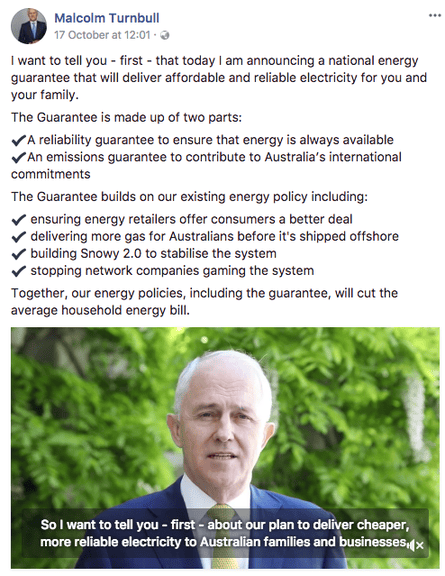If you’re over 25, live in Australia and have a family then you might have seen Malcolm Turnbull pop up in your Facebook feed last week, with a video spruiking the new energy policy.
This video and text post was “sponsored” – that is, someone from the prime minister’s office paid to promote the post as an advertisement.
A few days later, the activist group GetUp posted a video criticising the new energy policy and also paid money to turn it into an ad. They appear to have targeted their video more broadly, limiting it to people over 18 and living in Australia.

Normally it’s very difficult to see when these political ads go out on Facebook. Unless they pop up in your feed, there’s no way to determine that they appeared as an ad. It’s also possible to create “dark posts”, which only show up as ads and not as a post on your Facebook page.
This makes it very difficult to see which groups are campaigning for which cause and fact-check what they’re saying in their ads. Targeted Facebook ads were a tactic seen throughout the Trump campaign and was believed to have contributed to his victory in the 2016 election.
With the help of readers and in collaboration with the US news organisation ProPublica, we’re now tracking these ads and have published a database of all the material.
We’ve already shown how Adani created an ad to respond to revelations its Australian coal operations face growing financial risks and how no campaigners created an ad that told people they could request a new survey form to change their vote.
In the database now are even more ads campaigning on the same-sex marriage survey. Some are from pages that appear to not have any identifying information, which may go against a new law that requires authorisation on all advertising around the sam- sex marriage survey.
The ads target Australian Facebook users based on their age, location and Facebook interests, with the no campaign targeting people interested in “family”, “prayer” or “Christianity”, while ads from yes campaigners have targeted people who liked their pages.
State politics is present too, with a One Nation ad targeting people in Queensland saying: “Queensland, the old parties have lost their way. The old parties have stopped listening to you, they have stopped listening to small business.”
A sponsored post from South Australian premier Jay Weatherill’s page linked to government messaging on job creation, while other state politicians promoted community events.
If you want to help improve transparency around political advertising in Australia, you can read more about how to take part here.

Comments (…)
Sign in or create your Guardian account to join the discussion